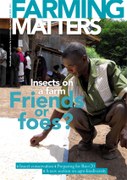The Empowering Smallholder Farmers in Markets (ESFIM) initiative is a farmer-driven research and policy development programme that started in June 2008. Its overall objective is to generate demand-driven action research that supports the policy activities of farmers’ organisations. By helping to create an enabling policy and regulatory environment, and more effective economic organisations and institutions, this initiative will enable smallholders to benefit more from markets.

Yet smallholder farmers are important. There are millions of them worldwide, and they play a key role in household and national food supply and economic development. At the same time there is a huge concentration of poverty in rural areas.
Decision-making on agricultural and food security issues often favours the interests of consumers, and the interests of smallholders are rarely considered in regional and national discussions. This reflects the way in which food security policies are usually responses to short-term problems, rarely looking at the medium to long term development of the agriculture sector – further aggravating a situation of food instability and insecurity. Strengthening the voice of smallholders can help to re-balance these policies and interventions in ways that provide smallholders with incentives to invest in their farms and in value-adding activities, thereby structurally improving food security in both rural and urban areas.
ESFIM in Peru
Peru has a strong advocacy platform called CONVEAGRO, an influential alliance of farmers’ organisations, NGOs and research institutes. The majority of the involved farmers’ organisations do not engage in collective marketing services, although some of them do. This group wanted CONVEAGRO to pay more attention to economic issues and to make them more effective at advocacy. To this end they formed a sub-group that partnered with ESFIM. During the first ESFIM workshop in 2009, they identified three priority areas where research support was needed: government procurement procedures; quality requirements and internal control systems, and management challenges in collective marketing.
The platform undertook a critical reflection on the government procurement policies. Peru has an extensive legal framework related to government procurement from small-scale farmers. The most prominent programme is PRONAA, a national initiative that procures for nutritional programmes, which has the explicit mission of acquiring products from smallscale farmers.
However, reality is more complex, with middlemen brokering deals with buyers and collecting false certificates that show that farmers supplied them with the products. As a result of this and other malpractices, many farmers’ associations and cooperatives are excluded. In addition, government programmes take a long time to pay and the procedures are complicated. Farmers’ organisations find it hard to get access to capital because of their lack of collateral.
To analyse this, and further develop the advocacy agenda on government procurement policies, in-depth case-studies were commissioned to examine successful experiences, where organised producer groups have managed to sell their produce to government procurement programmes. These studies are now being used by CONVEAGRO and others to lobby in favour of changes that will give smallholders better access to government programmes and as learning material for organisations that want to benefit from this market.
Defining the agenda
The ESFIM programme is designed to tackle this. It seeks to reinforce the capacities of farmers’ organisations to articulate their members’ needs and interests, through a process of collaborative research.
The identification of specific research priorities and strategies is determined at a national level, usually through a series of participative workshops, involving key organisations and their members. These workshops are enriched with the input of government officials and NGOs, helping participants identify critical and strategic issues.
This process of setting priorities is designed to maximise learning within all the participating organisations. With funds from IFAD and the Dutch Ministry of Economic Affairs, Agriculture and Innovation, AGRINATURA and local consultants have provided research support and helped participating organisations to refine their proposals. Local research institutes and independent consultants are subcontracted by farmers’ organisations to develop the thematic issues discussed in the national workshop.
At the moment, activities are in full swing in ten countries. In the Philippines, for example, the aim is to establish an Agricultural Commodity Exchange System to improve the co-ordination mechanisms between stakeholders throughout the country.
In Benin, specific attention is being given to maize value chains, aiming to make them “more competitive, sustainable and inclusive”. The National Smallholder Farmers’ Association of Malawi is working towards improving the seed supply system. The ESFIM website (www.esfim.org) presents news and results from each of the participating countries.
Coming up
ESFIM intends to scale-out its approach to other countries, and link these national experiences in evidence-based advocacy at the regional and global level, through regional networks of farmers’ organisations.
Key findings and experiences were recently presented at the Farmers’ Forum organised by IFAD in Rome, and will be discussed extensively in an international seminar planned for mid-2012.
ESFIM wants to stimulate farmers’ organisations to exchange their experiences on advocacy strategies that empower smallholders. This exchange will not be restricted to the organisations that are working with ESFIM funding, but will also include other similar or complementary organisations, initiatives and activities.
We plan to use Farming Matters as a platform to facilitate this exchange and outreach. More news in the coming issues!
Text: Giel Ton
Giel Ton (giel.ton@wur.nl) a senior researcher in the Agricultural Research Institute (LEI), part of Wageningen UR, is the ESFIM Programme Coordinator. More information about the programme and about the participating organisations can be found online at www.esfim.org

